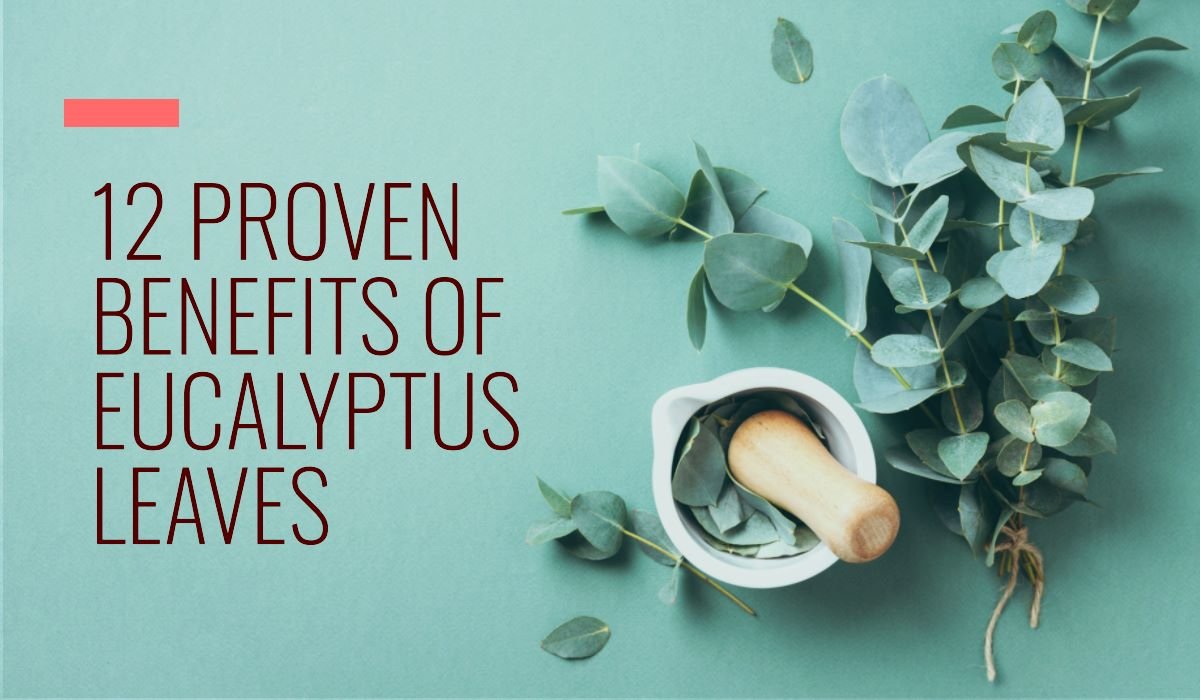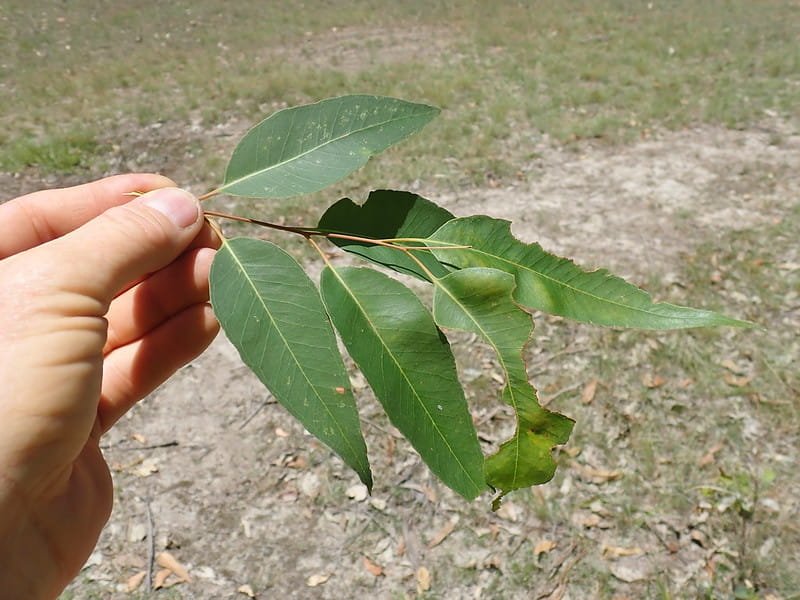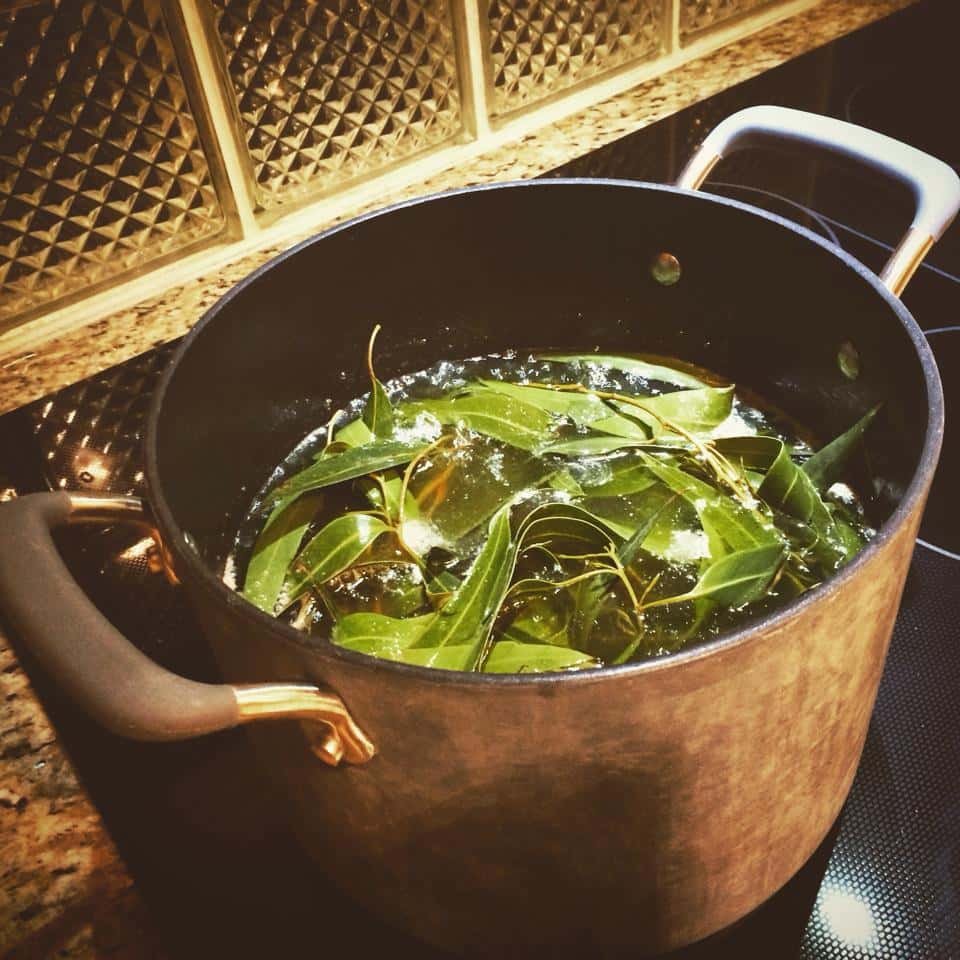12 PROVEN Eucalyptus Leaves Benefits Backed By Scientific Evidence

Following our article on the Eucalyptus oil benefits, today we’re going to explore the benefits of using eucalyptus leaves. Find the hidden properties of eucalyptus leaves as we delve into their antibacterial, antiseptic and expectorant properties which have been valued for centuries.
Eucalyptus leaves, known for their natural scent, have been used for centuries. They were important in traditional healing and are now gaining popularity in modern wellness. In this article we are going to explore Eucalyptus leaves benefits that are proven on what they claim.
Historical Application of Eucalyptus Leaves in Healing
In traditional medicine, indigenous communities have used eucalyptus for its multifaceted healing properties. From the Aboriginal people of Australia to the ancient civilizations of the Mediterranean, these leaves were admired for their therapeutic potential.
The Aboriginal people of Australia were among the earliest to recognize the medicinal value of eucalyptus leaves. They would crush the leaves and use them to make infusions or inhale the aromatic vapors to treat respiratory ailments. [1]
Eucalyptus leaves were also used topically to soothe wounds and insect bites due to their antiseptic properties.

Moving over to the ancient civilizations of the Mediterranean, such as the Greeks and the Romans, eucalyptus leaves were also esteemed for their healing properties.
They often used the leaves to create steam baths infused with the pleasant scent of eucalyptus, which was believed to alleviate respiratory congestion and promote relaxation.
One of the primary compounds responsible for eucalyptus leaves’ therapeutic effects is eucalyptol, known for its anti-inflammatory and decongestant properties. In traditional healing practices, these benefits were harnessed through methods like steam inhalation, poultices, and infusions.
Interestingly, the knowledge about eucalyptus’s healing potential was passed down through generations in indigenous communities. And as modern science advanced, it began to shed light on the mechanisms behind these traditional uses. Research has confirmed that eucalyptol does indeed possess anti-inflammatory, analgesic, and antimicrobial properties, which aligns with the historical applications of the leaves.
Today, eucalyptus leaves are still widely utilized for their therapeutic benefits. Eucalyptus essential oil, derived from the leaves, is a common ingredient in aromatherapy, chest rubs, and cold remedies. The leaves themselves are used in teas, ointments, and even inhaled in steam form to relieve congestion and ease respiratory discomfort
The Science Behind the Scent
Eucalyptus leaves boast a rich and diverse composition, granting them a multifaceted role in enhancing health. The star of the show is undoubtedly eucalyptol, the primary active ingredient in eucalyptus oil celebrated for its robust antibacterial, antifungal and antiseptic properties.
Yet, its prowess extends further as a potent expectorant, aiding in mucus thinning and airway clearance, a boon for those grappling with congestion.
Complementing this potent compound are tannins, known for their anti-inflammatory and astringent qualities, capable of quelling inflammation and revitalizing the skin.
Meanwhile, flavonoids, rich in antioxidants and anti-inflammatory benefits, protect against free radical damage. The ethereal volatile oils, imparting eucalyptus leaves with their signature fragrance, round out this holistic health package.
While eucalyptus composition may vary by species and environment, their consistent health-boosting potential remains firm.
How To Use Eucalyptus Leaves
Eucalyptus leaves can be used in various ways to harness their therapeutic benefits. Here are some common methods:
- Steam Inhalation: Boil a pot of water and add a handful of eucalyptus leaves. Remove the pot from the heat source and place your head over the pot, covering it with a towel to create a tent. Inhale the steam deeply, which can help alleviate congestion and respiratory discomfort.
- Eucalyptus Tea: Make a soothing tea by steeping dried eucalyptus leaves in hot water. Allow the leaves to infuse for about 5-10 minutes before drinking. Eucalyptus tea is believed to have decongestant and anti-inflammatory properties, making it helpful for respiratory issues.
- Eucalyptus Oil: Eucalyptus essential oil is a versatile option. You can add a few drops to a diffuser to fill the room with its pleasant aroma and potentially help with respiratory congestion. Diluted eucalyptus oil can also be applied topically to the chest or back to provide a soothing sensation.
- Topical Application: Fresh eucalyptus leaves or eucalyptus oil can be used topically on the skin. They are often applied as a compress or poultice to treat minor wounds, cuts, and insect bites due to their antiseptic properties.
- Eucalyptus Bath: Add eucalyptus leaves to your bathwater for a relaxing and invigorating experience. The steam from the warm water will release the aromatic compounds, creating a spa-like atmosphere that can promote relaxation and ease respiratory congestion.
- Eucalyptus Infused Oil: Create your own eucalyptus-infused oil by steeping dried eucalyptus leaves in a carrier oil (like olive oil or coconut oil) for a few weeks. Strain out the leaves, and you’ll have a homemade oil that can be used for massages or as a moisturizer.
- Sachets and Potpourri: Dry eucalyptus leaves can be added to sachets or potpourri blends to infuse your living space with their invigorating scent. Placing these in closets or drawers can help deter insects as well.
Eucalyptus Leaves Benefits
Eucalyptus leaves, known for their distinct aroma and healing properties, offer a plethora of remarkable benefits that extend far beyond their use as a koala’s primary diet. From respiratory relief to natural insect repellent, discover the top advantages of incorporating eucalyptus leaves into your daily life.
1. Relieves respiratory problems
Eucalyptus leaves, is a well-known ailment to alleviate respiratory discomfort. One of its primary functions is to thin mucus and facilitate the opening of airways, which can be especially beneficial for individuals suffering from respiratory congestion. [2]
When you boil eucalyptus leaves and inhale the steam that comes out, eucalyptus leaves works effectively to clear nasal and chest congestion, making it a popular choice for relieving symptoms associated with common colds, sinusitis, and allergies.

In addition to its mucus-thinning properties, eucalyptus oil’s anti-inflammatory attributes play a significant role in soothing irritated air passages.
2. Fights infection
Eucalyptus leaves possesses robust antibacterial and antifungal properties, making it a valuable natural remedy for combatting various infections, including common ailments like colds, flu, and urinary tract infections. [3]
These properties are attributed to the active compounds found in eucalyptus , such as cineole and terpenes, which have potent antimicrobial effects.
To use Eucalyptus leaves to fight infection you can buy eucalyptus leaves tea and sip 3 – 4 cups per day to fight off the disease.
3. Reduces pain and inflammation
Eucalyptus leaves versatile benefits extend to topical applications as well. When applied directly to the skin, it can effectively relieve pain and inflammation associated with various conditions, including arthritis, muscle strain, and bruises.
Its anti-inflammatory properties can help soothe sore joints and muscles, offering relief to individuals suffering from discomfort.
4. Improves wound healing
Using Eucalyptus alba leaves to heal wounds, especially in people with diabetes, seems to be a promising approach in healthcare. It can help to reduce pain, inflammation, and infection, and it can also help to keep the wound moist, which is important for healing.
Scientists studied how these leaves could be turned into helpful extracts by using different temperatures and liquids. [4]
The findings showed that all the extracts made from these leaves had great abilities to fight diabetes, reduce harmful effects caused by oxidation, and encourage cells to grow. The best results were seen when the leaves were dried at temperatures below 30°C and extracted using a liquid called ethanol.
5. Repels insects

Eucalyptus leaves possess natural properties that can repel insects, making them useful in keeping these pests at bay. The strong, distinct aroma of eucalyptus contains compounds such as cineole (also known as eucalyptol), which is known for its repellent effects on insects. [5]
When the leaves release their scent, it acts as a deterrent to various insects. This includes mosquitoes, flies, ants, and even some spiders. These insects are often sensitive to certain scents, and the powerful fragrance of eucalyptus is unpleasant for them, causing them to steer clear of areas where the scent is present.
People have taken advantage of this natural repellent property for centuries. Eucalyptus leaves or eucalyptus oil can be strategically placed around homes, gardens, or outdoor seating areas to discourage insects from entering.
Related: 6 Easy Recipes on How to Make Natural Mosquito Repellent At Home
6. Promotes Youthful Skin
Eucalyptus leaves are known for their potential benefits for the skin. They contain a variety of compounds – such as eucalyptol – that can contribute to skin health.
For example, they can help soothe irritated skin and provide relief from discomfort. Additionally, eucalyptus leaves contain antioxidants that can help protect the skin from damage caused by free radicals, which are molecules that can harm cells and contribute to premature aging. These antioxidants can help maintain a youthful appearance and support overall skin health.
Eucalyptus leaves also have natural antimicrobial properties. This means that products containing eucalyptus extracts or oils can help combat bacteria and fungi that might lead to skin infections or breakouts. This makes eucalyptus a potential ingredient in skincare products designed to address acne or other skin issues.
You can use eucalyptus leaves for skin treatment as follows:
- Eucalyptus Steam Facial: This method can be quite refreshing and beneficial for your skin. Boil a pot of water and add a handful of eucalyptus leaves. Once the water is steaming, carefully lean over the pot (at a safe distance) with a towel draped over your head to create a steam tent. Allow the steam to open up your pores and let the eucalyptus aroma soothe you. Be cautious not to get too close to avoid burns from the steam.
- Eucalyptus Bath: You can add eucalyptus leaves to your bath for a relaxing and skin-soothing experience. Simply toss a handful of dried eucalyptus leaves into your warm bathwater. The aromatic steam from the leaves can have a calming effect, and the natural compounds may benefit your skin.
7. Reduces stress and anxiety
Eucalyptus is believed to reduce stress and anxiety primarily through aromatherapy and its soothing properties. Inhaling the pleasant scent of eucalyptus can stimulate the brain’s limbic system, which regulates emotions, leading to reduced anxiety and enhanced relaxation.
In a study with 62 patients, researchers explored the impact of inhaling eucalyptus oil and its components on anxiety before a medical procedure. Participants inhaled different substances, including 1,8-cineole, and a control group used almond oil. Anxiety levels were significantly lower in the 1,8-cineole group, suggesting its potential for anxiety relief before procedures like selective nerve root block. [6]
One potential method of using eucalyptus leaves for anxiety relief is through aromatherapy. Dried eucalyptus leaves can be placed in a bowl or sachet and kept in areas where you spend time, like your bedroom or workspace. As the leaves release their natural aroma, it could create a calming atmosphere and potentially help reduce feelings of anxiety.
8. Helps Keeping Children Alert In Classrooms
In the pursuit of enhancing classroom engagement and academic performance, a groundbreaking study has delved into the potential benefits of eucalyptus in education. Adolescents nodding off during class is a common concern, negatively impacting their ability to learn and participate effectively.
The study focused on aromatherapy, specifically the use of essential oils like eucalyptus and peppermint, known for their ability to stimulate brain centers associated with attention. The research aimed to explore how these specific scents, often employed to boost alertness, could effectively address inattentiveness in various educational settings.
Results were intriguing; sleep patterns, a potential contributor to inattention, were found not to be the primary influencing factor. Instead, the introduction of aromatherapy essential oils during the study’s intervention phase led to a remarkable improvement in the target subject’s alertness compared to the placebo phase.
Consistent behaviors of low alertness during placebo phases reinforced the conclusion that the significant enhancement in alertness during the aromatherapy phase was attributed to the eucalyptus and peppermint essential oils.
9. Makes you sweat Less

Eucalyptus also boasts the potential to curb sweating, thanks to its eucalyptol content.
This compound operates akin to menthol, modifying the brain’s perception of body heat and subsequently diminishing sweat production.
Additionally, eucalyptus aids in improving circulation, a factor that contributes to lowering overall body temperature.
10. Acts as a natural deodorant
Eucalyptus oil can be used as a natural deodorant to control body odor produced by bacterial action.
To use eucalyptus leaves as a natural deodorant, you can gather fresh or dried leaves and create a bundle by tying them together. Hang this bundle in your closet or other areas where you want to maintain a fresh scent and combat odors.
Over time, the leaves will release their natural fragrance, providing a refreshing and natural deodorizing effect. Optionally, you can enhance the effect by using eucalyptus essential oil mixed with water in a spray bottle to mist on fabrics or in living spaces.
11. Fights dandruff
Eucalyptus is being well documented over the ages to help fight dandruff and other scalp
ailments. Its potent antimicrobial and anti-inflammatory properties make it a natural ally in maintaining a healthy scalp. Eucalyptus contains compounds like eucalyptol that can effectively combat the fungi responsible for dandruff and prevent their overgrowth.
Regular use of eucalyptus-infused treatments can provide relief from the itching and flaking associated with dandruff. Moreover, its cooling and soothing effects can help alleviate scalp irritation, leaving you with a refreshed sensation. By incorporating eucalyptus into your hair care routine, you not only address dandruff but also promote an environment where your scalp can thrive.
To combat dandruff using eucalyptus leaves, follow these steps for a natural and refreshing approach:
- Prepare Eucalyptus Infused Oil: Begin by infusing eucalyptus leaves into carrier oil. You can use olive oil, coconut oil, or any oil of your choice. Crush a handful of eucalyptus leaves and mix them with the oil. Heat the mixture on low heat for about 5-10 minutes, allowing the oil to absorb the beneficial properties of the leaves. Let it cool and strain out the leaves.
- Application: Apply the eucalyptus-infused oil onto your scalp. Part your hair and massage the oil gently onto your scalp using your fingertips. Make sure to cover the entire scalp.
- Relaxation Time: After applying the oil, let it sit for at least 30 minutes. You can wrap your hair in a warm towel to enhance the absorption of the oil and create a soothing experience.
- Shampoo and Rinse: After the oil has been left to work its magic, wash your hair with a mild, preferably natural, anti-dandruff shampoo. Make sure to rinse thoroughly to remove any residue.
12. Can Help With Bacterial Endometritis Treatment
Bacterial endometritis, a major cause of fertility issues in farm animals, often treated with antibiotics, has raised concerns about antibiotic residues. This study explored Eucalyptus robusta leaves as an alternative.
They tested its effects against endometritis using clinical bacterial isolates. Rats with endometritis were treated with Eucalyptus extract or an antibiotic. Inflammatory markers were measured in uterine tissues.
The extract reduced markers linked to inflammation and showed curative effects, comparable to the antibiotic. Eucalyptus Robusta leaves could be a potential treatment for animal endometritis, offering antibacterial benefits without antibiotic worries.
Cautions and Considerations
Eucalyptus leaves may offer a plethora of benefits, but like any natural remedy, they come with their own set of cautions and considerations. It’s essential to be aware of these factors to ensure safe and effective usage.
Potential Allergies
- While eucalyptus oil can be beneficial for the skin, some individuals may experience skin sensitivity or irritation when using it directly. It’s advisable to perform a patch test by applying a diluted solution of eucalyptus oil to a small area of skin before using it extensively.
- Inhaling eucalyptus oil, especially in large quantities, can cause respiratory issues for some people. Those with asthma or other respiratory conditions should be cautious when using eucalyptus in steam inhalations or diffusers. Always use eucalyptus oils in well-ventilated areas.
The Bottom Line
Overall, eucalyptus leaves are versatile and offer numerous health benefits. They contain antioxidants like flavonoids that protect against oxidative stress and inflammation due to the presence of tannins.
Eucalyptus leaves have antibacterial and antiseptic properties, making them useful for relieving coughs, colds, congestion, muscle and joint pain.
Additionally, they can enhance skin health when incorporated into massage oils and baths, but it’s crucial to prepare them properly through steeping or steaming before use to avoid consumption.
The Lost Book of Herbal Remedies
You’ll find 800+ beneficial plants and remedies in “The Lost Book of Herbal Remedies“.
It includes recipes of tinctures, teas, decoctions, essential oils, syrups, salves, poultices, infusions and many other natural remedies that our grandparents used for centuries.
What’s also special about this book is that it has between 2 and 4 high definition, color pictures for each plant and detailed identification guidelines to make sure you’ve got the right plant.
Read Next



